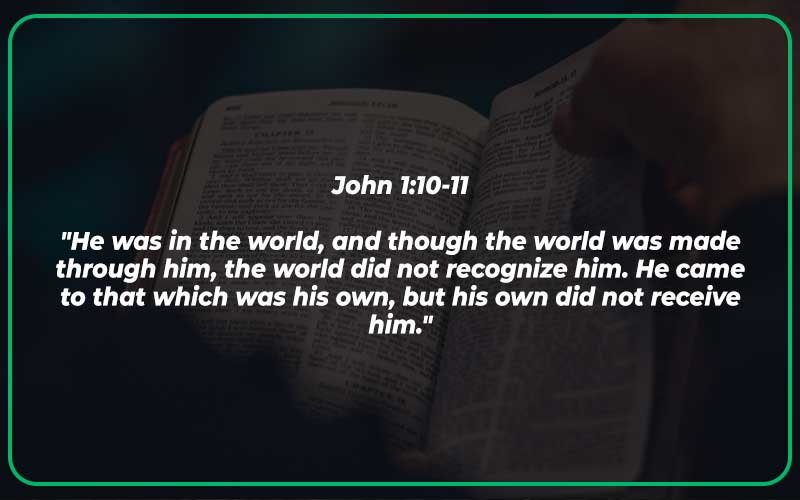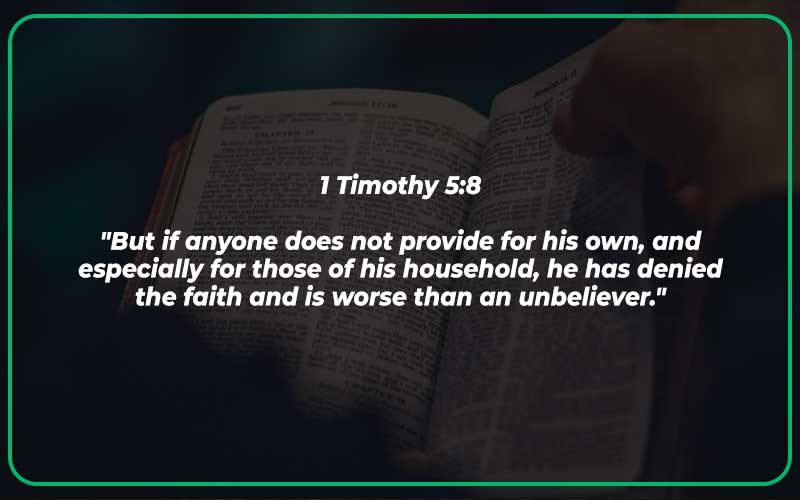The Bible is full of powerful messages and teachings that can be brought into our everyday lives. Denying God comes in many forms, such as rebelling against His commands or actively refusing to believe in Him.
Although it’s never easy to strive toward living a life of faith, taking the time to reflect on Bible verses about denying God can help strengthen our commitment and obedience to Him.
Here, we’ll look into some of the scriptures that speak to God’s perspective on denying His power and authority, and how it affects us.
Bible Verses About Denying God
Matthew 10:33
“But whoever denies me before men, I also will deny before my Father who is in heaven.”
This verse reflects the gravity of denying Christ in this life. Christ’s words are straightforward and stark. This denial is not just verbal, but it also manifests in actions, deeds, and in the heart. In denying Christ, we deny His sacrifice, love, and grace. Yet, the reverse is equally strong – acknowledging Christ brings eternal affirmation.
Luke 12:9
“But the one who denies me before men will be denied before the angels of God.”
This verse echoes the previous, reminding us of the celestial stakes of our terrestrial choices. Denying God isn’t a light matter, it carries spiritual repercussions. It highlights our accountability to God and the significance of our faithfulness.
2 Timothy 2:12
“If we endure, we will also reign with Him; If we deny Him, He also will deny us.”
This Pauline verse underscores the importance of steadfastness in our faith journey. The endurance in faith is promised to be rewarded with reigning alongside Christ, but denial leads to being denied by Him. It calls for a faithful and persistent relationship with God.
Jude 1:4
“For certain individuals whose condemnation was written about long ago have secretly slipped in among you. They are ungodly people, who pervert the grace of our God into a license for immorality and deny Jesus Christ our only Sovereign and Lord.”
This verse issues a warning about those who twist God’s grace as an excuse for immoral acts, thereby denying Jesus. It encourages discernment and understanding of the true nature of God’s grace, which doesn’t permit sin but rather liberates from it.
1 John 2:22
“Who is the liar but he who denies that Jesus is the Christ? This is the antichrist, he who denies the Father and the Son.”
Here, John identifies denial of Jesus as Christ as a major falsehood, even equating it to the spirit of the antichrist. This verse stresses the central Christian tenet that Jesus is the Christ, and denial of this is a serious breach of faith.
Titus 1:16
“They profess to know God, but they deny him by their works. They are detestable, disobedient, unfit for any good work.”
In this verse, Paul describes how some individuals profess to know God but their actions contradict their words. It underlines the importance of consistency between belief and action, suggesting that genuine faith manifests in righteous deeds.
Also Read: 24 Bible Verses About the Path of the Righteous Man (With Commentary)
Matthew 26:34
“Jesus said to him, ‘Truly, I tell you, this very night, before the rooster crows, you will deny me three times.'”
This verse recounts Jesus predicting Peter’s denial. It serves as a potent reminder of human weakness, even amongst the faithful. Yet, it also previews God’s forgiving nature, as Peter, despite his denial, becomes a pillar of the early church.
Matthew 26:75
“And Peter remembered the saying of Jesus, ‘Before the rooster crows, you will deny me three times.’ And he went out and wept bitterly.”
Peter’s poignant realization of his denial underscores the painful consequences of denying Christ. It paints a picture of deep regret, emphasizing the personal and emotional ramifications of such actions.
John 1:10-11
“He was in the world, and though the world was made through him, the world did not recognize him. He came to that which was his own, but his own did not receive him.”
This verse speaks to the ultimate denial, the world not recognizing Christ despite being His creation. It illustrates the profound sorrow of the world not accepting its Savior.

Mark 14:30
“And Jesus said to him, ‘Truly, I tell you, this very night, before the rooster crows twice, you will deny me three times.'”
Here, Jesus forewarns Peter of his impending denial. It’s a reminder of the omniscience of God, knowing our actions even before we do, and the mercy of Jesus, who forgave Peter despite his betrayal.
2 Peter 2:1
“But false prophets also arose among the people, just as there will be false teachers among you, who will secretly bring in destructive heresies, even denying the Master who bought them, bringing upon themselves swift destruction.”
Peter alerts believers to the existence of false teachers who, through heresies, deny God, leading to their destruction. It’s a call to discernment and vigilance in maintaining true faith.
1 Timothy 5:8
“But if anyone does not provide for his relatives, and especially for members of his household, he has denied the faith and is worse than an unbeliever.”
Paul argues that those neglecting familial responsibilities have effectively denied faith. It underscores that the principles of Christianity extend beyond the spiritual into practical, everyday living.
Luke 22:61
“And the Lord turned and looked at Peter. And Peter remembered the saying of the Lord, how he had said to him, ‘Before the rooster crows today, you will deny me three times.'”
In this emotionally charged scene, Peter’s denial intersects with Jesus’ knowing gaze, reminding us that denial doesn’t occur in a vacuum. It’s seen, known, and felt by God.
Mark 14:72
“And immediately the rooster crowed a second time. And Peter remembered how Jesus had said to him, ‘Before the rooster crows twice, you will deny me three times.’ And he broke down and wept.”
Peter’s immediate regret upon realizing his denial of Jesus demonstrates the painful consequences of such action. It is a sobering depiction of remorse and the human capacity for failure.
1 John 2:23
“No one who denies the Son has the Father. Whoever confesses the Son has the Father also.”
John reaffirms the intimate relationship between accepting Jesus as the Son and having a relationship with God the Father. Denial of Jesus, therefore, is tantamount to a denial of God.
Revelation 3:8
“I know your works. Behold, I have set before you an open door, which no one is able to shut. I know that you have but little power, and yet you have kept my word and have not denied my name.”
This verse provides encouragement to those who persevere in their faith and refrain from denying God’s name, even amidst challenges. It offers a hopeful perspective, affirming God’s recognition of steadfast faithfulness.
Luke 22:34
“Jesus said, ‘I tell you, Peter, the rooster will not crow this day, until you deny three times that you know me.'”
Jesus’s prophetic words to Peter about his imminent denial underpin the human tendency towards weakness under pressure. But it also alludes to the compassionate understanding and forgiveness of Christ.
John 18:25
“Now Simon Peter was standing and warming himself. So they said to him, ‘You also are not one of his disciples, are you?’ He denied it and said, ‘I am not.'”
This is one of the instances where Peter denies Jesus, showing that even the most devoted can falter. It emphasizes the need for grace and mercy in our faith journey.
John 18:27
“Peter again denied it, and at once a rooster crowed.”
The final denial of Peter fulfilling Jesus’s prophecy underscores the seriousness of denial. The immediate crowing of the rooster symbolizes the awareness of wrongdoing and the onset of remorse.
John 13:38
“Jesus answered, ‘Will you lay down your life for me? Truly, truly, I say to you, the rooster will not crow till you have denied me three times.'”
Jesus questions Peter’s declaration of unwavering loyalty, foretelling his denial. It’s a reminder that human commitment often falters, hence the need for divine grace.
Acts 3:13-14
“The God of Abraham, Isaac and Jacob, the God of our fathers, has glorified his servant Jesus. You handed him over to be killed, and you disowned him before Pilate, though he had decided to let him go. You disowned the Holy and Righteous One and asked that a murderer be released to you.”
In this verse, Peter boldly confronts the crowd with their denial of Jesus. It’s a striking indictment, reminding us that denial can often stem from choosing the world over righteousness.
Acts 7:35
“This Moses, whom they rejected, saying, ‘Who made you a ruler and a judge?’—this man God sent as both ruler and redeemer by the hand of the angel who appeared to him in the bush.”
The Israelites’ initial rejection of Moses prefigures the denial of Jesus. It serves as a warning against rejecting God’s chosen instruments for our redemption and guidance.
Hebrews 11:24-25
“By faith Moses, when he was grown up, refused to be called the son of Pharaoh’s daughter, choosing rather to be mistreated with the people of God than to enjoy the fleeting pleasures of sin.”
Moses, in his choice, provides a counter-example to denial. He embraces his God-given identity over worldly privilege, encouraging believers to do the same.
1 Corinthians 1:18
“For the message of the cross is foolishness to those who are perishing, but to us who are being saved it is the power of God.”
Paul reflects on the rejection and denial of the cross by those perishing, a sobering reminder that the path of faith often runs counter to worldly wisdom. Yet for believers, this ‘foolishness’ is the power of God, affirming our need to embrace it fully.
2 Peter 2:21
“For it would have been better for them not to have known the way of righteousness, than after knowing it, to turn back from the holy commandment delivered to them.”
In this verse, Peter states that it’s more regrettable for someone to know the right path, then deny it and turn back, compared to not knowing at all. This is a stern warning about the repercussions of denying the truth once it’s been revealed to us.
1 John 4:3
“And every spirit that does not confess Jesus is not from God. This is the spirit of the antichrist, which you heard was coming and now is in the world already.”
John asserts that the refusal to confess Jesus is a mark of the antichrist. This stresses the spiritual implications of denying Jesus, identifying it as contrary to God’s will and reflective of worldly influence.
Revelation 2:13
“I know where you dwell, where Satan’s throne is. Yet you hold fast my name, and you did not deny my faith even in the days of Antipas my faithful witness, who was killed among you, where Satan dwells.”
This verse praises those who keep faith and refuse to deny God despite being in the midst of evil. This determination to hold onto God’s name amidst trials is a testimony of resolute faith.
2 Timothy 3:5
“Having the appearance of godliness, but denying its power. Avoid such people.”
Paul warns Timothy about people who maintain a façade of godliness but deny its true power, thereby indicating a false form of faith. This serves as an admonishment for believers to discern true faith from pretentious religiosity.
1 Timothy 5:8
“But if anyone does not provide for his own, and especially for those of his household, he has denied the faith and is worse than an unbeliever.”
Paul equates the neglect of familial duties with denying the faith. By highlighting the practical aspects of faith, it’s made clear that faith is not merely about affirmations but also about living out the commandments of love and care.

Also Read: 27 Bible Verses About Oh Give Thanks Unto the Lord (With Commentary)
Titus 2:12
“Training us to renounce ungodliness and worldly passions, and to live self-controlled, upright, and godly lives in the present age.”
This verse is a clear call to deny worldly passions and ungodliness, emphasizing that faith should guide believers toward a life of self-control, integrity, and godliness. It’s a compelling reminder that denying God often coincides with embracing worldly desires.
What does the Bible say About Denying God?
The Bible contains several passages that warn against the act of denying or rejecting God. It emphasizes the significance of acknowledging and worshiping the one true God. In both the Old and New Testaments, denial of God is often associated with disobedience, idolatry, and a departure from moral and spiritual truths.
In the Old Testament, the Israelites are repeatedly admonished not to turn to false gods or idols. This is seen as a betrayal of their covenant with the God of Israel. Prophets like Isaiah and Jeremiah vehemently rebuke idolatry and call the people back to the worship of Yahweh.
In the New Testament, particularly in the teachings of Jesus and the writings of the apostles, the rejection of God is seen as a serious spiritual condition. Jesus speaks about the consequences of denying Him before men, emphasizing the importance of confessing faith in Him. The apostles, in their letters, warn against apostasy and the dangers of turning away from the faith.
Overall, the Bible portrays denial of God as a serious spiritual issue with significant consequences, but also leaves room for repentance and returning to God’s grace through faith and sincere contrition.

